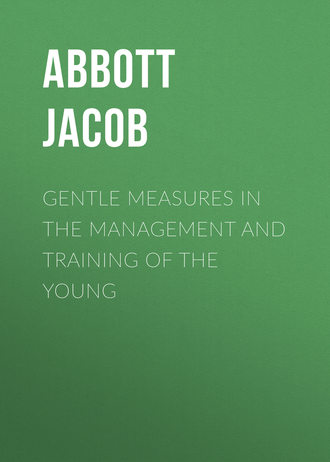
Gentle Measures in the Management and Training of the Young
Other states and conditions in which the mental element is more apparent are communicated from one to another in the same or, at least, in some analogous way. Being simply in the presence of one who is amused, or happy, or sad, causes us to feel amused, or happy, or sad ourselves—or, at least, has that tendency—even if we do not know from what cause the emotion which is communicated to us proceeds. A person of a joyous and happy disposition often brightens up at once any little circle into which he enters, while a morose and melancholy man carries gloom with him wherever he goes. Eloquence, which, if we were to hear it addressed to us personally and individually, in private conversation, would move us very little, will excite us to a pitch of the highest enthusiasm if we hear it in the midst of a vast audience; even though the words, and the gestures, and the inflections of the voice, and the force with which it reaches our ears, were to be precisely the same in the two cases. And so a joke, which would produce only a quiet smile if we read it by ourselves at the fireside alone, will evoke convulsions of laughter when heard in a crowded theatre, where the hilarity is shared by thousands.
A new element, indeed, seems to come into action in these last two cases; for the mental condition of one mind is not only communicated to another, but it appears to be increased and intensified by the communication. Each does not feel merely the enthusiasm or the mirth which would naturally be felt by the other, but the general emotion is vastly heightened by its being so largely shared. It is like the case of the live coal, which does not merely set the dead coal on fire by being placed in contact with it, but the two together, when together, burn far more brightly than when apart.
Wonderful Power of SympathySo much for the reality of this principle; and it is almost impossible to exaggerate the extent and the magnitude of the influence it exerts in forming the character and shaping the ideas and opinions of men, and in regulating all their ordinary habits of thought and feeling. People's opinions are not generally formed or controlled by arguments or reasonings, as they fondly suppose. They are imbibed by sympathy from those whom they like or love, and who are, or have been, their associates. Thus people, when they arrive at maturity, adhere in the main to the associations, both in religion and in politics, in which they have been brought up, from the influence of sympathy with those whom they love. They believe in this or that doctrine or system, not because they have been convinced by proof, but chiefly because those whom they love believe in them. On religious questions the arguments are presented to them, it is true, while they are young, in catechisms and in other forms of religious instruction, and in politics by the conversations which they overhear; but it is a mistake to suppose that arguments thus offered have any material effect as processes of ratiocination in producing any logical conviction upon their minds. An English boy is Whig or Tory because his father, and his brothers, and his uncles are Whigs or Tories. He may, indeed, have many arguments at his command with which to maintain his opinions, but it is not the force of the arguments that has convinced him, nor do they have any force as a means of convincing the other boys to whom he offers them. They are controlled by their sympathies, as he is by his. But if he is a popular boy, and makes himself a favorite among his companions, the very fact that he is of this or that party will have more effect upon the other boys than the most logical and conclusive trains of reasoning that can be conceived.
So it is with the religious and political differences in this and in every other country. Every one's opinions—or rather the opinion of people in general, for of course there are many individual exceptions—are formed from sympathy with those with whom in mind and heart they have been in friendly communication during their years of childhood and youth. And even in those cases where persons change their religious opinions in adult age, the explanation of the mystery is generally to be found, not in seeking for the argument that convinced them, but for the person that led them, in the accomplishment of the change. For such changes can very often, and perhaps generally, be traced to some person or persons whose influence over them, if carefully scrutinized, would be found to consist really not in the force of the arguments they offered, but in the magic power of a silent and perhaps unconscious sympathy. The way, therefore, to convert people to our ideas and opinions is to make them like us or love us, and then to avoid arguing with them, but simply let them perceive what our ideas and opinions are.
The well-known proverb, "Example is better than precept," is only another form of expressing the predominating power of sympathy; for example can have little influence except so far as a sympathetic feeling in the observer leads him to imitate it. So that, example is better than precept means only that sympathy has more influence in the human heart than reasoning.
The Power of Sympathy in ChildhoodThis principle, so powerful at every period of life, is at its maximum in childhood. It is the origin, in a very great degree, of the spirit of imitation which forms so remarkable a characteristic of the first years of life. The child's thoughts and feelings being spontaneously drawn into harmony with the thoughts and feelings of those around him whom he loves, leads, of course, to a reproduction of their actions, and the prevalence and universality of the effect shows how constant and how powerful is the cause. So the great secret of success for a mother, in the formation of the character of her children, is to make her children respect and love her, and then simply to be herself what she wishes them to be.
And to make them respect and love her, is to control them by a firm government where control is required, and to indulge them almost without limit where indulgence will do no harm.
Special Application of the PrincipleBut besides this general effect of the principle of sympathy in aiding parents in forming the minds and hearts of their children, there are a great many cases in which a father or mother who understands the secret of its wonderful and almost magic power can avail themselves of it to produce special effects. One or two examples will show more clearly what I mean.
William's aunt Maria came to pay his mother a visit in the village where William's mother lived. On the same day she went to take a walk with William—who is about nine years old—to see the village. As they went along together upon the sidewalk, they came to two small boys who were trying to fly a kite. One of the boys was standing upon the sidewalk, embarrassed a little by some entanglement of the string.
"Here, you fellow!" said William, as he and his aunt approached the spot, "get out of the way with your kite, and let us go by."
The boy hurried out of the way, and, in so doing, got his kite-string more entangled still in the branches of a tree which grew at the margin of the sidewalk.
Now William's aunt might have taken the occasion, as she and her nephew walked along, to give him some kind and friendly instruction or counsel about the duty of being kind to every body in any difficulty, trouble, or perplexity, whether they are young or old; showing him how we increase the general sum of happiness in so doing, and how we feel happier ourselves when we have done good to any one, than when we have increased in any way, or even slighted or disregarded, their troubles. How William would receive such a lecture would depend a great deal upon his disposition and state of mind. But in most cases such counsels, given at such a time, involving, as they would, some covert though very gentle censure, would cause the heart of the boy to close itself in a greater or less degree against them, like the leaves of a sensitive-plant shrinking from the touch. The reply would very probably be, "Well, he had no business to be on the sidewalk, right in our way."
William and his aunt walked on a few steps. His aunt then stopped, hesitatingly, and said,
"How would it do to go back and help that boy disentangle his kite-string? He's a little fellow, and does not know so much about kites and kite-strings as you do."
Here the suggestion of giving help to perplexity and distress came associated with a compliment instead of what implied censure, and the leaves of the sensitive-plant expanded at once, and widely, to the genial influence.
"Yes," said William; "let's go."
So his aunt turned and went back a step or two, and then said, "You can go and do it without me. I'll wait here till you come back. I don't suppose you want any help from me. If you do, I'll come."
"No," aid William, "I can do it alone."
So William ran on with great alacrity to help the boys clear the string, and then came back with a beaming face to his aunt, and they walked on.
William's aunt made no further allusion to the affair until the end of the walk, and then, on entering the gate, she said, "We have had a very pleasant walk, and you have taken very good care of me. And I am glad we helped those boys out of their trouble with the kite."
"So am I," said William.
Analysis of the IncidentNow it is possible that some one may say that William was wrong in his harsh treatment of the boys, or at least in his want of consideration for their perplexity; and that his aunt, by her mode of treating the case, covered up the wrong, when it ought to have been brought distinctly to view and openly amended. But when we come to analyze the case, we shall find that it is not at all certain that there was any thing wrong on William's part in the transaction, so far as the state of his heart, in a moral point of view, is concerned. All such incidents are very complicated in their nature, and in their bearings and relations. They present many aspects which vary according to the point of view from which they are regarded. Even grown people do not always see all the different aspects of an affair in respect to which they are called upon to act or to form an opinion, and children, perhaps, never; and in judging their conduct, we must always consider the aspect in which the action is presented to their minds. In this case, William was thinking only of his aunt. He wished to make her walk convenient and agreeable to her. The boy disentangling his string on the sidewalk was to him, at that time, simply an obstacle in his aunt's way, and he dealt with it as such, sending the boy off as an act of kindness and attention to his aunt solely. The idea of a sentient being suffering distress which he might either increase by harshness or relieve by help was not present in his mind at all. We may say that he ought to have thought of this. But a youthful mind, still imperfect in its development, can not be expected to take cognizance at once of all the aspects of a transaction which tends in different directions to different results. It is true, that he ought to have thought of the distress of the boys, if we mean that he ought to be taught or trained to think of such distress when he witnessed it; and that was exactly what his aunt was endeavoring to do. We ourselves have learned, by long experience of life, to perceive at once the many different aspects which an affair may present, and the many different results which may flow in various directions from the same action; and we often inconsiderately blame children, simply because their minds are yet so imperfectly developed that they can not take simultaneous cognizance of more than one or two of them. This is the true philosophy of most of what is called heedlessness in children, and for which, poor things, they receive so many harsh reprimands and so much punishment.
A little girl, for example, undertakes to water her sister's plants. In her praiseworthy desire to do her work well and thoroughly, she fills the mug too full, and spills the water upon some books that are lying upon the table. The explanation of the misfortune is simply that her mind was filled, completely filled, with the thoughts of helping her sister. The thought of the possibility of spilling the water did not come into it at all. There was no room for it while the other thought, so engrossing, was there; and to say that she ought to have thought of both the results which might follow her action, is only to say that she ought to be older.
Sympathy as the Origin of childish Fears.
The power of sympathy in the mind of a child—that is, its tendency to imbibe the opinions or sentiments manifested by others in their presence—may be made very effectual, not only in inculcating principles of right and wrong, but in relation to every other idea or emotion. Children are afraid of thunder and lightning, or of robbers at night, or of ghosts, because they perceive that their parents, or older brothers or sisters, are afraid of them. Where the parents do not believe in ghosts, the children are not afraid of them; unless, indeed, there are domestics in the house, or playmates at school, or other companions from whom they take the contagion. So, what they see that their parents value they prize themselves. They imbibe from their playmates at school a very large proportion of their tastes, their opinions, and their ideas, not through arguments or reasoning, but from sympathy; and most of the wrong or foolish notions of any kind that they have acquired have not been established in their minds by false reasoning, but have been taken by sympathy, as a disease is communicated by infection; and the remedy is in most cases, not reasoning, but a countervailing sympathy.
Afraid of a KittenLittle Jane was very much afraid of a kitten which her brother brought home—the first that she had known. She had, however, seen a picture of a tiger or some other feline animal devouring a man in a forest, and had been frightened by it; and she had heard too, perhaps, of children being scratched by cats or kittens. So, when the kitten was brought in and put down on the floor, she ran to her sister in great terror, and began to cry.
Now her sister might have attempted to reason with her by explaining the difference between the kitten and the wild animals of the same class in the woods, and by assuring her that thousands of children have kittens to play with and are never scratched by them so long as they treat them kindly—and all without producing any sensible effect. But, instead of this, she adopted a different plan. She took the child up into her lap, and after quieting her fears, began to talk to the kitten.
"Poor little pussy," said she, "I am glad you have come. You never scratch any body, I am sure, if they are kind to you. Jennie will give you some milk some day, and she and I will like to see you lap it up with your pretty little tongue. And we will give you a ball to play with some day upon the carpet. See, Jennie, see! She is going to lie down upon the rug. She is glad that she has come to such a nice home. Now she is putting her head down, but she has not any pillow to lay it upon. Wouldn't you like a pillow, kitty? Jennie will make you a pillow some day, I am sure, if you would like one. Jennie is beginning to learn to sew, and she could make you a nice pillow, and stuff it with cotton wool. Then we can see you lying down upon the rug, with the pillow under your head that Jennie will have made for you—all comfortable."
Such a talk as this, though it could not be expected entirely and at once to dispel Jennie's unfounded fears, would be far more effectual towards beginning the desired change than any arguments or reasoning could possibly be.
Any mother who will reflect upon the principle here explained will at once recall to mind many examples and illustrations of its power over the hearts and minds of children which her own experience has afforded. And if she begins practically and systematically to appeal to it, she will find herself in possession of a new element of power—new, at least, to her realization—the exercise of which will be as easy and agreeable to herself as it will be effective in its influence over her children.
CHAPTER XI. SYMPATHY:—II. THE PARENT WITH THE CHILD
I think there can be no doubt that the most effectual way of securing the confidence and love of children, and of acquiring an ascendency over them, is by sympathizing with them in their child-like hopes and fears, and joys and sorrows—in their ideas, their fancies, and even in their caprices, in all cases where duty is not concerned. Indeed, the more child-like, that is, the more peculiar to the children themselves, the feelings are that we enter into with them, the closer is the bond of kindness and affection that is formed.
An ExampleIf a gentleman coming to reside in a new town concludes that it is desirable that he should be on good terms with the boys in the streets, there are various ways by which he can seek to accomplish the end. Fortunately for him, the simplest and easiest mode is the most effectual. On going into the village one day, we will suppose he sees two small boys playing horse. One boy is horse, and the other driver. As they draw near, they check the play a little, to be more decorous in passing by the stranger. He stops to look at them with a pleased expression of countenance, and then says, addressing the driver, with a face of much seriousness, "That's a first-rate horse of yours. Would you like to sell him? He seems to be very spirited." The horse immediately begins to prance and caper. "You must have paid a high price for him. You must take good care of him. Give him plenty of oats, and don't drive him hard when it is hot weather. And if ever you conclude to sell him, I wish you would let me know."
So saying, the gentleman walks on, and the horse, followed by his driver, goes galloping forward in high glee.
Now, by simply manifesting thus a fellow-feeling with the boys in their childish play, the stranger not only gives a fresh impulse to their enjoyment at the time, but establishes a friendly relationship between them and him which, without his doing any thing to strengthen or perpetuate it, will of itself endure for a long time. If he does not speak to the boys again for months, every time they meet him they will be ready to greet him with a smile.
The incident will go much farther towards establishing friendly relations between him and them than any presents that he could make them—except so far as his presents were of such a kind, and were given in such a way, as to be expressions of kindly feeling towards them—that is to say, such as to constitute of themselves a manifestation of sympathy.
The uncle who gives his nephews and nieces presents, let them be ever so costly or beautiful, and takes no interest in their affairs, never inspires them with any feeling of personal affection. They like him as they like the apple-tree which bears them sweet and juicy apples, or the cow that gives them milk—which is on their part a very different sentiment from that which they feel for the kitten that plays with them and shares their joys—or even for their dolls, which are only pictured in their imagination as sharing them.
Sophronia and AureliaMiss Sophronia calls at a house to make a visit. A child of seven or eight years of age is playing upon the floor. After a little time, at a pause in the conversation, she calls the child—addressing her as "My little girl"—to come to her. The child—a shade being cast over her mind by being thus unnecessarily reminded of her littleness—hesitates to come. The mother says, "Come and shake hands with the lady, my dear!" The child comes reluctantly. Miss Sophronia asks what her name is, how old she is, whether she goes to school, what she studies there, and whether she likes to go to school, and at length releases her. The child, only too glad to be free from such a tiresome visitor, goes back to her play, and afterwards the only ideas she has associated with the person of her visitor are those relating to her school and her lessons, which may or may not be of an agreeable character.
Presently, after Miss Sophronia has gone, Miss Aurelia comes in. After some conversation with the mother, she goes to see what the child is building with her blocks. After looking on for a moment with an expression of interest in her countenance, she asks her if she has a doll. The child says she has four. Miss Aurelia then asks which she likes best, and expresses a desire to see that one. The child, much pleased, runs away to bring it, and presently comes back with all four. Miss Aurelia takes them in her hands, examines them, talks about them, and talks to them; and when at last the child goes back to her play, she goes with the feeling in her heart that she has found a new friend.
Thus, to bring ourselves near to the hearts of children, we must go to them by entering into their world. They can not come to us by entering ours. They have no experience of it, and can not understand it. But we have had experience of theirs, and can enter it if we choose; and in that way we bring ourselves very near to them.
Sympathy must be SincereBut the sympathy which we thus express with children, in order to be effectual, must be sincere and genuine, and not pretended. We must renew our own childish ideas and imaginations, and become for the moment, in feeling, one with them, so that the interest which we express in what they are saying or doing may be real, and not merely assumed. They seem to have a natural instinct to distinguish between an honest and actual sharing of their thoughts and emotions, and all mere condescension and pretense, however adroitly it may be disguised.
Want of TimeSome mothers may perhaps say that they have not time thus to enter into the ideas and occupations of their children. They are engrossed with the serious cares of life, or busy with its various occupations. But it does not require time. It is not a question of time, but of manner. The farmer's wife, for example, is busy ironing, or sewing, or preparing breakfast for her husband and sons, who are expected every moment to come in hungry from their work. Her little daughter, ten years old, comes to show her a shawl she has been making from a piece of calico for her doll. The busy mother thinks she must say, "Yes; but run away now, Mary; I am very busy!"—because that is the easiest and quickest thing to say; but it is just as easy and just as quick to say, "What a pretty shawl! Play now that you are going to take Minette out for a walk in it!" The one mode sends the child away repulsed and a little disappointed; the other pleases her and makes her happy, and tends, moreover, to form a new bond of union and sympathy between her mother's heart and her own. A merchant, engrossed all day in his business, comes home to his house at dinner-time, and meets his boy of fifteen on the steps returning from his school. "Well, James," he says, as they walk together up stairs, "I hope you have been a good boy at school to-day." James, not knowing what to say, makes some inaudible or unmeaning reply. His father then goes on to say that he hopes his boy will be diligent and attentive to his studies, and improve his time well, as his future success in life will depend upon the use which he makes of his advantages while he is young; and then leaves him at the head of the stairs, each to go to his room.
All this is very well. Advice given under such circumstances and in such a way produces, undoubtedly, a certain good effect, but it does not tend at all to bring the father and son together. But if, instead of giving this common-place advice, the father asks—supposing it to be winter at the time—"Which kind of skates are the most popular among the boys nowadays, James?" Then, after hearing his reply, he asks him what his opinion is, and whether any great improvement has been made within a short time, and whether the patent inventions are any of them of much consequence. The tendency of such a conversation as this, equally brief with the other, will be to draw the father and son more together. Even in a moral point of view, the influence would be, indirectly, very salutary; for although no moral counsel or instruction was given at the time, the effect of such a participation in the thoughts with which the boy's mind is occupied is to strengthen the bond of union between the heart of the boy and that of his father, and thus to make the boy far more ready to receive and be guided by the advice or admonitions of his father on other occasions.









